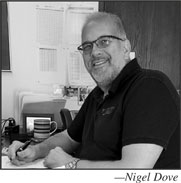by DONNA CURRIE
 Vortex De-Pollution got its start in the UK when Nigel Dove (now the chief executive officer) was doing some work in the UK for a scrap company that was the precursor to Sims Metal Management. Dove explained that in 2004 the UK passed legislation for processing end-of-life vehicles. This led him to invent a closed loop system that drains gas and other fluids from cars and pumps the fluids directly into storage tanks.
Vortex De-Pollution got its start in the UK when Nigel Dove (now the chief executive officer) was doing some work in the UK for a scrap company that was the precursor to Sims Metal Management. Dove explained that in 2004 the UK passed legislation for processing end-of-life vehicles. This led him to invent a closed loop system that drains gas and other fluids from cars and pumps the fluids directly into storage tanks.
His system received a brief moment in the spotlight during a National Geographic series called Megashredders: Planes, Trains and Cars. The series visited Sims and showed fluids being drained using Dove’s invention.
As car recyclers in the UK were required to follow the 2004 law, Dove built more units. In 2005, he sold 50 in the UK, and it wasn’t long before he thought, “The U.S. is the place to go.” He realized there were a lot more cars being recycled in the U.S., and plenty of recyclers could use his machines.
He kept building his business in the UK, but in 2008 he went to an ISRI convention in the U.S. to gauge interest. He said he was “inundated with people” who stopped by his booth. “I decided we needed to be here,” he said, so in 2010 he opened an office and developed products specifically for the U.S. market. “Everything was bigger in that product version, so the fluids would pump faster,” he said. The systems were environmentally friendly and safe for users while they drained vehicle fluids.
Before long, someone asked for a platform version that would provide easy access to the top side of a car, and he designed that version of his machine.
Of course, much of what Vortex offers is customer driven. While the company provides standard equipment along with a variety of add-ons, they’re always willing to listen to a customer’s specific needs when it is necessary “to get a little bit fancy.” Later, those needs might be revised to fit a larger audience.
“Once we’ve designed a machine, we put it on our offer list,” he said, and Vortex begins to offer other versions as well.
Vortex recently built a machine that could process 500 catalytic converters per hour for a customer who required that volume. Later, they used some of the same technology to design a machine that could process 80 catalytic converters per hour and be affordable for people who might process 30 to 40 per hour. If a machine is not in stock, it can generally be built in one or two weeks.
“That’s the best bit,” Dove said, “designing and making systems that work well.” Besides fluid recovery systems, he designed catalytic converter shears, as well as a machine that crushes wheels then eliminates tires so metal recovery is efficient. Dove said that the traditional way of removing tires from wheels is time consuming, while his system “breaks the rims” so clean aluminum is released quickly.
At first, Vortex systems were mostly sold to junkyards that removed fluids before scavenging the profitable parts, but “scrap guys were bidding less often on cars because they were experiencing less value recovery,” Dove said. It wasn’t long before auto shredding companies were buying Vortex systems so they could safely remove fluids.
One challenge Dove sees in auto processing now, is how “electric vehicles bring a whole new raft of issues” including “high voltage batteries that can kill you.” Once the batteries are disconnected, the capacitors are still full of charge, so recyclers may need to learn new skills. “Battery recycling is going to be the new catalytic converter,” he said, since it is important to recycle the rare earth metals involved.
While Dove enjoys the challenges of engineering new products and improving old ones, “getting everybody in the right frame of mind” is a little less pleasant. He said that there is that “enlightened guy that goes to shows” to learn about new environmentally friendly technologies, but there are other people who don’t want to learn anything new. “A lot of them are under the radar,” he said.
Vortex is a global company, they assemble all of their U.S. products in Denver, but the staff there is small – only five people do the work. “The manufacturing process is quite streamlined,” Dove said. Parts are purchased from trusted suppliers, and the final assembly is done in-house.
Vortex machines are built to be easily maintained, and all parts are ready to ship if customers need a replacement. However, maintenance parts can also be purchased elsewhere, like the hoses that are all made with standard U.S. fittings “so you can go to a hose shop” for a repair part.
Besides selling their U.S. made machines and guillotine shears, Vortex also offers products sourced from outside the U.S., including an engine cracker and car and nonferrous balers. And while they’re known for making drainage systems,
Vortex also offers wire harness processors, alligator shears and more.
Published in the Febuary 2019 Edition







